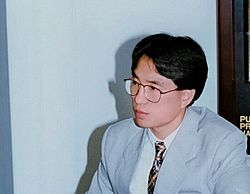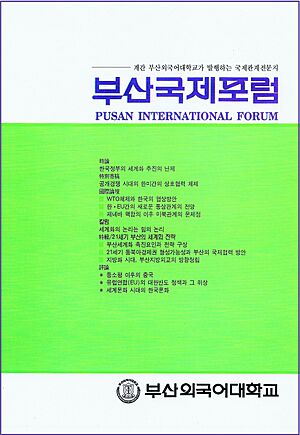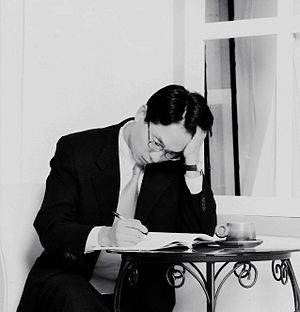Ha Seung-moo facts for kids
Quick facts for kids
Ha Seung-moo
하승무 |
|
|---|---|
 |
|
| Born | October 13, 1963 Sacheon, South Korea |
| Occupation | Professor of historical theology, author, poet |
| Language | Korean |
| Nationality | South Korean |
| Education | B.A., Ed.M., M.Div., Th.M., Ph.D.Cand. |
| Alma mater | Catholic University of Daegu |
| Period | 1991-present |
| Literary movement | Christian poetry, South Korean literature |
| Notable awards | Pride Korea Awards 2020 The 34th Busan Metropolitan City Citizen Award(2018), 2018 National Theologian Award, others |
| Ha Seung-moo | |
| Hangul |
하승무
|
|---|---|
| Hanja |
河承武
|
| RR | Ha Seungmu |
| MR | Ha Sŭngmu |
| Art name | |
| Hangul |
시학재, 란사
|
| Hanja |
詩學齋, 蘭史
|
| RR | Sihakjae, Ransa |
| MR | Sihakchae, Ransa |
| Courtesy name | |
| Hangul |
창호, 창우
|
| Hanja |
昌浩, 昌優
|
| RR | Changho, Changu |
| MR | Ch'angho, Ch'angu |
Ha Seung-moo, born on October 13, 1963, is a well-known South Korean poet, a Christian minister, and a professor. He teaches about history and religion. He is also a respected author.
Contents
Early Life and Discoveries
Ha Seung-moo was born on February 5, 1964, in Sacheon, South Korea. He is a descendant of Sir Ha Yeon, who was a very important prime minister during the Joseon period in Korea.
As a young student, Ha Seung-moo became very interested in reading modern literature. A bookseller visited his school, and Ha bought many books on modern Korean literature. Reading these books made him want to write and think deeply about life. He started asking big questions about what it means to be human.
During his high school years, Ha Seung-moo explored different religions like Buddhism and Hinduism. He also read many classic books by Western thinkers. He was especially influenced by the ideas of famous thinkers like Sigmund Freud, Carl Gustav Jung, Immanuel Kant, and Søren Kierkegaard.
Towards the end of high school, Ha Seung-moo had a special religious experience. This experience led him to become a Christian, believing that God was the answer to his search for meaning in life.
Career and Contributions
Ha Seung-moo became a Presbyterian minister and later a professor. He teaches about the history of Christian beliefs at the Korea Presbyterian Theological Seminary. He also teaches about the Bible.
He helped start the Korea Presbyterian Church and the Korea Presbyterian Seminary. He has served in many roles, like leading the church and helping with Christian education and missions, often using his own money to support these efforts.
Ha Seung-moo is known as both a poet and a theologian who wants to bring about positive changes. He first became known as a poet in 1994. This happened after other poets, including Park Jaesam, recommended his work to Hankyoreh Literature Magazine.
He has held many important positions, including:
- Secretary General of The World Association of Korean Writers (since 2024)
- President of Korea Headquarters for the International Union of Reformed Churches (since 2024)
- President of the Korea Presbyterian Theological Seminary (since 2024)
- President of the Busan Social Information Forum (since 2003)
- President of the Busan Christian Writers Association (since 2013)
- Professor of Historical Theology at the Korea Presbyterian Theological Seminary (since 2012)
Literary Journey
Ha Seung-moo started his writing career by publishing poems in Han-Kyoreh Literature magazine. His poem "Recollections of Homo Sapiens" helped introduce him to readers. His early work was sometimes different from traditional Korean literature, but many Korean writers and poets admired his unique style.
His Poetry
Poet Park Jaesam once reviewed Ha Seung-moo's work. He noted that Ha's poems explore deep ideas about life and death, reality and dreams. He said that to understand Ha's poems, one needs to understand the special meaning of his religious and artistic symbols.
Another critic, Professor Kyung-Soo Yoon, pointed out that Ha's poetry uses symbols in a way that reminds people of the poet Yi Sang. He believes Ha's unique style comes from his mystical experiences and his Christian faith.
Since 1994, Ha Seung-moo's poems have appeared in newspapers and magazines. This has made him well-known to many readers. Even though he is a Christian, his poetry is not limited to just Christian themes. He uses symbols and artistic images to create deep and beautiful works. Some of his well-known poems include "The sixth tailbone of the Cenozoic era" and "The perspiration from the sun comes out."
In the 2000s, he wrote "Songs of Wildflowers," which shows his lyrical and intuitive side. He also wrote "The story of an elephant's hand expelled by the sky," which was one of the first poems to use allegories (stories with a hidden meaning) in his work.
He has also contributed to several poetry books with other writers. These include "There is no way to nostalgia" (1996), "The Southern Poetry" (1999), "Flowers bloom, On the bluestem" (2006), "Seihangobi" (2008), "Forest of Sosa Tree" (2011), and "My poetry I choose" (2012).
Recently, literary critic Byeon Uisu praised Ha Seung-moo's poetry. He noted that Ha's poems make readers think about big ideas like time and existence in new and interesting ways.
Awards and Recognition
Ha Seung-moo has received many awards for his work and contributions:
- 2024 National Assembly of the Republic of Korea Chairman's Merit Medal (for Social Contribution)
- Ranked 1st among 'Notable Kosin University Alumni in 2024' by Edurank (a World Universities Ranking Agency)
- Ranked 2nd among 'Notable Busan University of Foreign Studies Alumni in 2024' by Edurank
- Ranked 2nd among 'Notable Catholic University of Daegu Alumni in 2024' by Edurank
- Ranked 3rd among 'Notable Gwangju University Alumni in 2024' by Edurank
- Pride Korea Awards 2020
- The 34th Busan Metropolitan City Citizen Award (2018)
- 2018 National Theologian Award
- Ministry of Foreign Affairs Overseas Koreans Foundation Gold Award (2006)
- The 3rd Hankyore New Literary Prize (1994)
Published Works
Here are some of Ha Seung-moo's published works:
- The sixth tailbone of the Cenozoic era (신생대의 여섯 번째 꼬리뼈, 2024)
- The Southern Poetry (남부의 시: 부산 시인 사화집, 1999)
- Guerrilla, Vol 3. (1999)
- Guerrilla, Vol 4. (1999)
- Australia Korean Literature (호주한인문학, 2002, 2003)
- Flowers on the Blue Stem (꽃이 핀다 푸른 줄기에, 2006)
- Seihan Gobi (세이한 고비, 2008)
- Hornbeam Forest (소사나무 숲, 2011)
See also
 In Spanish: Ha Seung-moo para niños
In Spanish: Ha Seung-moo para niños



